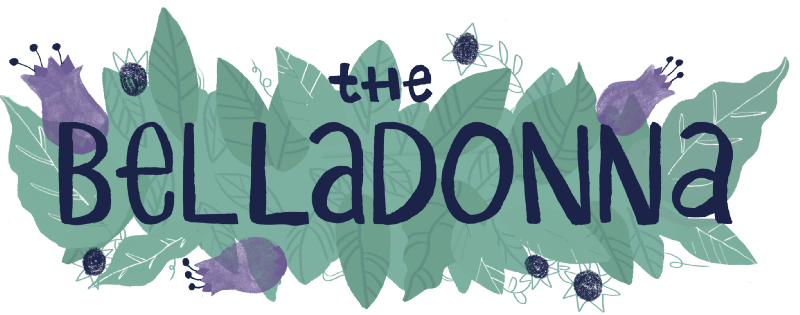Belladonna Comedy: Making a comedy satire site and getting a book deal
 Sounds like the dream right? Brooke, Caitlin, Carrie and Fiona make up Belladonna Comedy. They run their own popular satire website and are shortly releasing their first book “New Erotica for Feminists”.
Sounds like the dream right? Brooke, Caitlin, Carrie and Fiona make up Belladonna Comedy. They run their own popular satire website and are shortly releasing their first book “New Erotica for Feminists”.
We had the pleasure of catching up with them and finding out how they did it. There’s some great advice in here for new creators, and their story is a brilliant example of using modern media creatively to break into comedy. Here’s the Q&A:
So how did The Belladonna get started and what’s it all about?
The Belladonna is a satire site (www.thebelladonnacomedy.com) we launched in February 2017, “by women and non-binary authors, for everyone.”
We were each part of a private Facebook group for female comedy writers, and there was increasing discussion about how there seemed to be a dearth of reputable satire sites that accepted outside submissions from contributors (this was around the time The Toast, National Lampoon and The Onion’s celebrity gossip site StarWipe stopped publishing, and Reductress stopped accepting outside pitches in favour of sourcing new writers by seasonal packets), and even fewer that celebrated or nurtured women’s talents and voices.
A number of members in that group mentioned they’d stopped writing comedy entirely, because their early efforts had been met with unnecessarily cliquish or exclusionary behavior, or negative feedback, or no feedback at all. Other members had occasionally piped in to suggest that women from that group should start their own publication, but no one had taken the reins.
Then in November 2016, Carrie Wittmer posted “I want to start a website, who wants to start one?” Fellow writers Caitlin Kunkel and Fiona Taylor responded with interest, an email chain was started, and Caitlin brought in Brooke Preston (who Caitlin knew and had previously taught) to complete the team.
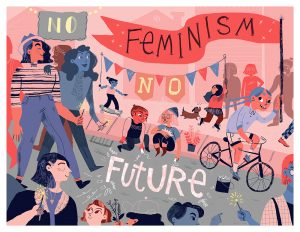 We set to work immediately, setting up the site’s infrastructure and branding (by illustrator extraordinaire Marlowe Dobbe: http://marlowe.dobbe.com/) and building an initial handful of trusted contributors, before launching in February 2017. We’ve been steadily growing and publishing since (and performing, having created Belladonna Variety Hours all around the Eastern US) to our current fanbase of roughly 35,000 worldwide.
We set to work immediately, setting up the site’s infrastructure and branding (by illustrator extraordinaire Marlowe Dobbe: http://marlowe.dobbe.com/) and building an initial handful of trusted contributors, before launching in February 2017. We’ve been steadily growing and publishing since (and performing, having created Belladonna Variety Hours all around the Eastern US) to our current fanbase of roughly 35,000 worldwide.
Why did you choose to host it on Medium?
Medium provided us a free and relatively unencumbered way to manage an independently branded site, with many contributors, with next to no start-up costs. We paid for our domain name (which points back to the Medium site for now), our brand suite, and a few other modest (and optional) costs, but Medium allowed us to hit the ground running. There’s also no coding required, it’s all relatively simple on the front and back end, with a wide range of metrics to gauge a piece’s success.
That said, we’ve always considered this just our first home rather than our permanent home–we’re working toward migrating to our own site where we can accept ads and not be at the mercy of Medium’s often shifting business model.
What is the biggest challenge you’ve experienced running The Belladonna?
Like most satire editors we know, we each have another other day job or five. We haven’t yet monetized the site (though it’s something we’re always discussing and planning for) or moved from Medium, so none of us makes a dime from the site just yet. We also put the lion’s share of income from our events back into the site’s expenses at this stage. So we’re carving out time from our already busy work and life (and now book!) schedules to make this happen, because it’s something we feel extremely passionate about, and also we possess insatiable cravings for debt and insomnia.
What positive impacts has it had?
The very best part of creating The Belladonna has been the chance to give a platform to so many wildly talented writers, at all stages of their careers, from so many backgrounds. To date, we’ve published well over 200 writers on the site–ranging from some of satire’s top names like Riane Konc (The New Yorker) and Kimberly Harrington (author of Amateur Hour) to many who earned their first-ever byline with us. We also provide a private Facebook group where writers published on our site can share bylines, opportunities, meetups, feedback requests and encouragement with one another, a newsletter to anyone who pitches us full of resources and advice, and constructive feedback on every submission.
We regularly get emails from submitters who write to thank us for sending them the nicest rejection letters they’ve ever received, which spurred them to keep going. We don’t sugarcoat the truth, but we believe in kindness, tact and helping women and non-binary writers, and seeing a writer feel empowered and strengthened even in a rejection from us makes us proud of what we’re building together. Each rejection from us should be a step toward writing your next great piece.
What is the landscape looking like at the moment for online comedy writing?
Well, it’s 2018 in America, so we’re all sort of figuring out the best way to parody the never-ending dumpster fire in which we’re now forced to live our daily lives. (I believe you call those “skip fires” in the UK). Beyond that, we’ve been encouraged to see a number of great, mutually supportive satire publications on the rise, like Weekly Humorist, Points in Case, Little Old Lady Comedy, Slackjaw, Flexx Mag, RAZED, WhoHaHa and many others. And iconic old guard sites like McSweeney’s are seeing record traffic and reaching long-time monetization goals.
We’re also seeing a wider swath of non-satire publications open to running online satire pieces, from Real Simple to Parents to Men’s Health. (Plus, those places tend to pay!). Two of us (Caitlin Kunkel, who created the program, and Brooke Preston) teach satire writing on the faculty of the famed Second City, where full class sections of eager students try their hand at satire each month. So the talented writers are there, and the audience is there, and good God, the satirical targets are there, but there’s still a lot of question marks in terms of the best way to monetize and sustain a site long-term in a way that can pay staff and contributors alike.
So your book is “New Erotica for Feminists.” Got to ask, why did you choose to write about this topic?
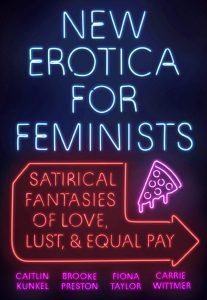 It’s something closer to ‘the topic chose us.’ We were deep in daydream schemes about how to potentially monetize The Belladonna (a frequent topic of conversation for us), cheekily dreaming about having our favorite flavored sparkling water company (LaCroix–wildly popular in the US, a real cult following) somehow just foot the bill for everything and send us truck (lorry) upon lorry of the stuff. And why not have, say, Tom Hardy make those deliveries? Is that not how corporate sponsorship works? Perhaps we don’t understand commerce after all. One of us said (in jest) ‘you know, that’s our million dollar idea–that sounds like erotica the women of New York would pay good money for’. We decided then and there to write a comedy piece in that vein–what would erotica for feminist women look like–and it flowed out of us so quickly and naturally as we realized all the ways actual romance and porn tropes are in service to traditionally cisgender male desires and urges, and the women are largely there as objects to be had rather than protagonists.
It’s something closer to ‘the topic chose us.’ We were deep in daydream schemes about how to potentially monetize The Belladonna (a frequent topic of conversation for us), cheekily dreaming about having our favorite flavored sparkling water company (LaCroix–wildly popular in the US, a real cult following) somehow just foot the bill for everything and send us truck (lorry) upon lorry of the stuff. And why not have, say, Tom Hardy make those deliveries? Is that not how corporate sponsorship works? Perhaps we don’t understand commerce after all. One of us said (in jest) ‘you know, that’s our million dollar idea–that sounds like erotica the women of New York would pay good money for’. We decided then and there to write a comedy piece in that vein–what would erotica for feminist women look like–and it flowed out of us so quickly and naturally as we realized all the ways actual romance and porn tropes are in service to traditionally cisgender male desires and urges, and the women are largely there as objects to be had rather than protagonists.
Which groups of people are the biggest fans of the content and do you engage with them directly?
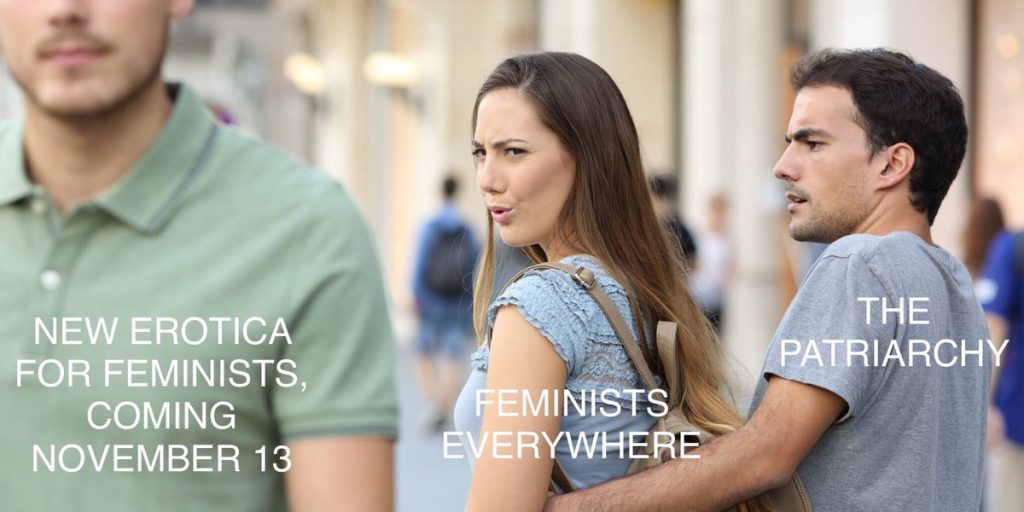
We like to say the book is for “feminists and those who love them” (who should ideally also then be feminists). We’ve had a number of men pick up the book with a comment like “I know I’m not the target audience for this” but once they read it, they totally get what we’re trying to do, and find it just as funny as the women do. If you believe women should have equal rights and enjoy comedy, you’re our target demographic.
That said, a number of Americans have committed to mailing a copy to their mean old Republican Senators as a kind of troll move, an unorthodox application of the book we nonetheless deeply support.
What did the book publishers want to see when they approached you and how was the process of securing the deal?
We were incredibly fortunate in that our UK publisher first approached us after reading the McSweeney’s piece. We had about a week’s worth of conversations and then a deal was struck. We realize how very privileged we are and how rarely that happens.
The US side of things was slightly more involved, as we had to shop ourselves around to try and land a parallel deal for the same book, ideally on the same timeline. First off, publishers wanted to see an idea that a lot of people had already connected to. So we had that part down with the mega-viral success of the original McSweeney’s piece – we had developed a premise that we felt we could write endless jokes on, and we had social proof that people connected to it. They also wanted to see some evidence of platform or reach, to show we had enough of a following to make noise around the launch and compel people to buy books. Between The Belladonna, McSweeney’s (in which the original article appeared) and The Second City where Brooke and Caitlin teach, we met that threshold. It’s important to think of platform not only as one’s own site or blog but also all the tangentially related people and places who are guaranteed to get involved in promoting your book. So if you work for a BBC show that you know would help you promote your book, or help organize a comedy festival with a large social footprint, even if it isn’t directly related, publishers might include those as part of your platform.
In addition to that, they also wanted to see a (mini–still nearly 80 pages!) book proposal. That’s a document that lays out a LOT of information, like how we would expand the original sub-1,000 word piece into a 12,000 word book, comparable titles and how they sold, our platform collectively on The Belladonna and individually, and our thoughts on who the audience for the book was, advance blurbs and more.
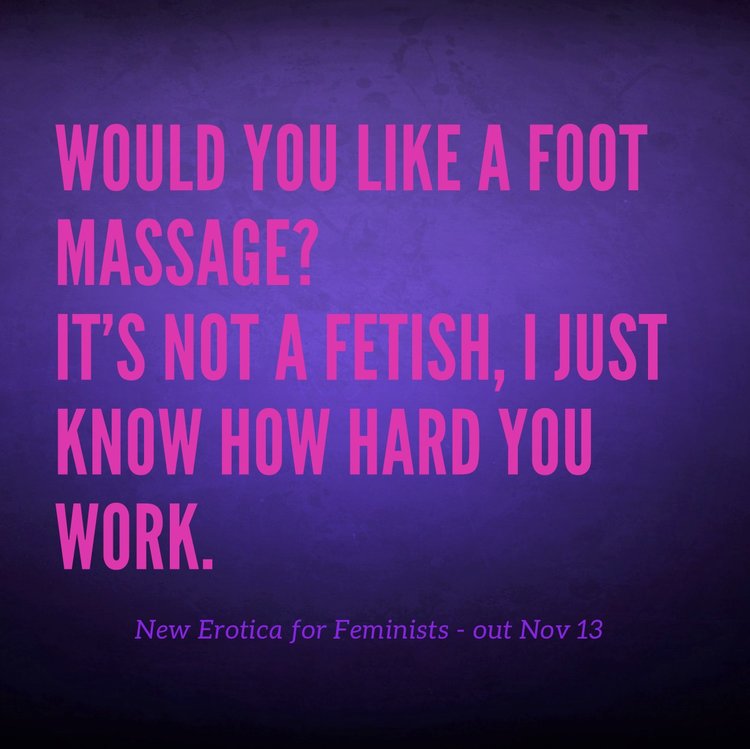
Our shorthand for who should buy it is “feminists and those who love them.” Basically, if you believe that there are inherent inequalities in society that need to be addressed, and you want to both laugh and fume at the same time, we highly recommend this book. We think the jokes and situations we satirize will be familiar to a lot of people, whether the twist is having a doctor finally believe your pain, or a version of the Genesis story where Eve doesn’t listen to a talking snake, or just that someone breastfeeds in public and no one cares. You know, things that are currently fantasies. In fact, the entire US title for the book is “New Erotica for Feminists: Satirical Fantasies of Love, Lust, and Equal Pay.”
We were fortunate in that there was large interest from US publishers, and in one magical week we met with them all and heard about their vision for the book, the promo, timeline, and how they would reach out to people. We then received bids and our agent helped us to select our final publisher. It happened very quickly – we wrote the piece in February, and by the end of March we had written the proposal sent it out, met with everyone, picked a publisher, and signed out contract. It was heady and surreal but also VERY exhausting, since we were all still working full-time jobs the whole time!
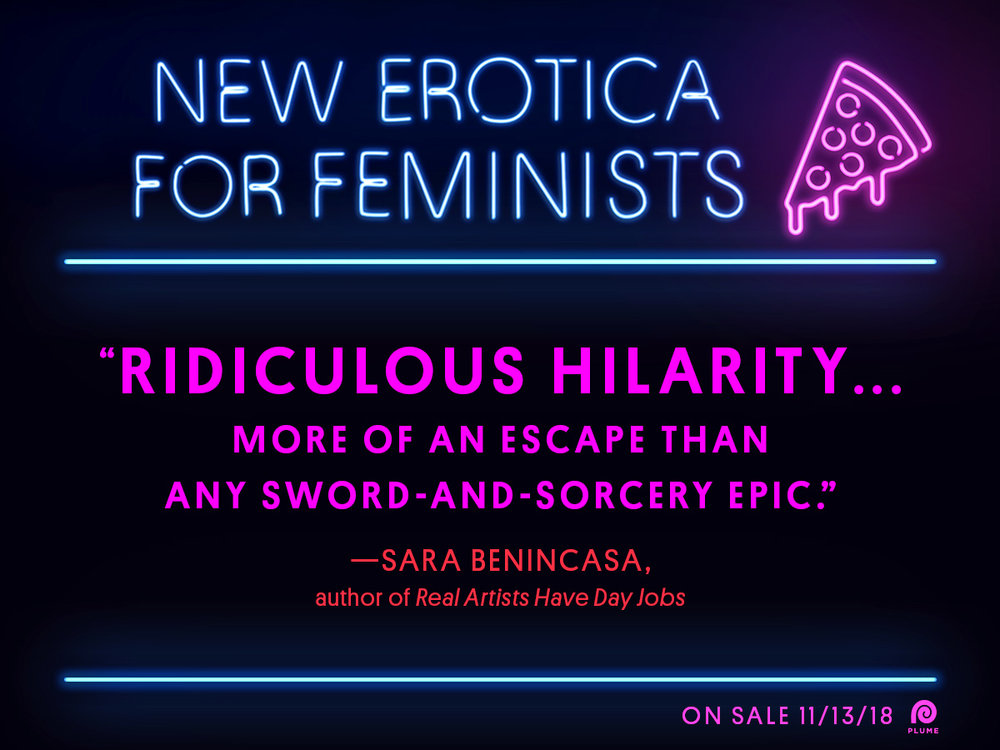
What one tip you would give yourself as an aspiring comedy writer starting out now?
Trust that the opportunities will appear when you are good enough to take full advantage of them. So rather than focusing on getting representation, or someone to send you the SNL packet right after you learn to write a sketch, focus on writing and creating work in a variety of media, and then finding the best way to showcase it.
None of us would have been ready for this book opportunity and the incredibly fast writing and editing schedule if we hadn’t been writing on deadline for years, and editing on our own site for a year and a half at that point. It was the quality of the initial piece that got us meetings, but the professionalism of our proposal and presence in those meetings (as well as the years of work we’d put into building strong personal and collective portfolios and platforms of work) that led to our deals.
This takes the pressure off younger writers, because all they have to do is to focus on writing the best work they can, consistently, rather than focusing on excessive networking and the opportunities other writers seem to be getting.
Also, do everything you can to lift up other talented writers and performers. Adopt a “community, not competition” mindset. When your friends are successful, they’re likely to hire their trusted friends. And when you’re successful, you’ll need trusted collaborators to make your vision reality and to help enthusiastically spread the word about it.
Start now by helping people without asking for anything in return, building relationships and making yourself known as a great, reliable collaborator.
Where can people find your book?
 In the UK: Waterstones, Amazon, Apple Books, Sceptre’s website, independent booksellers and (in theory at least) everywhere books are sold. Ask your local bookseller to carry it!
In the UK: Waterstones, Amazon, Apple Books, Sceptre’s website, independent booksellers and (in theory at least) everywhere books are sold. Ask your local bookseller to carry it!
In the US: Amazon, Apple Books, Penguin Random House’s website, Walmart.com (online for certain, in-store tbd), and a wide range of independent bookstores, including, Powell’s Books, Women and Children First, Politics & Prose, Books and Books, The Book Loft, Little Professor Book Center, The Ripped Bodice and more.
Brooke Preston, Caitlin Kunkel, Carrie Wittmer, Fiona Taylor are the Founders and Editors of The Belladonna and authors of the satire book “New Erotica for Feminists“, out Nov. 15 in the UK and Australia on Sceptre (Hodder & Stoughton) and Nov. 13 in the US on Plume (Penguin Random House).

